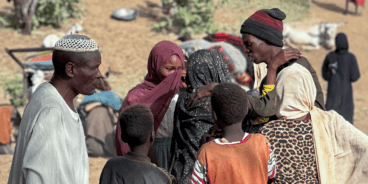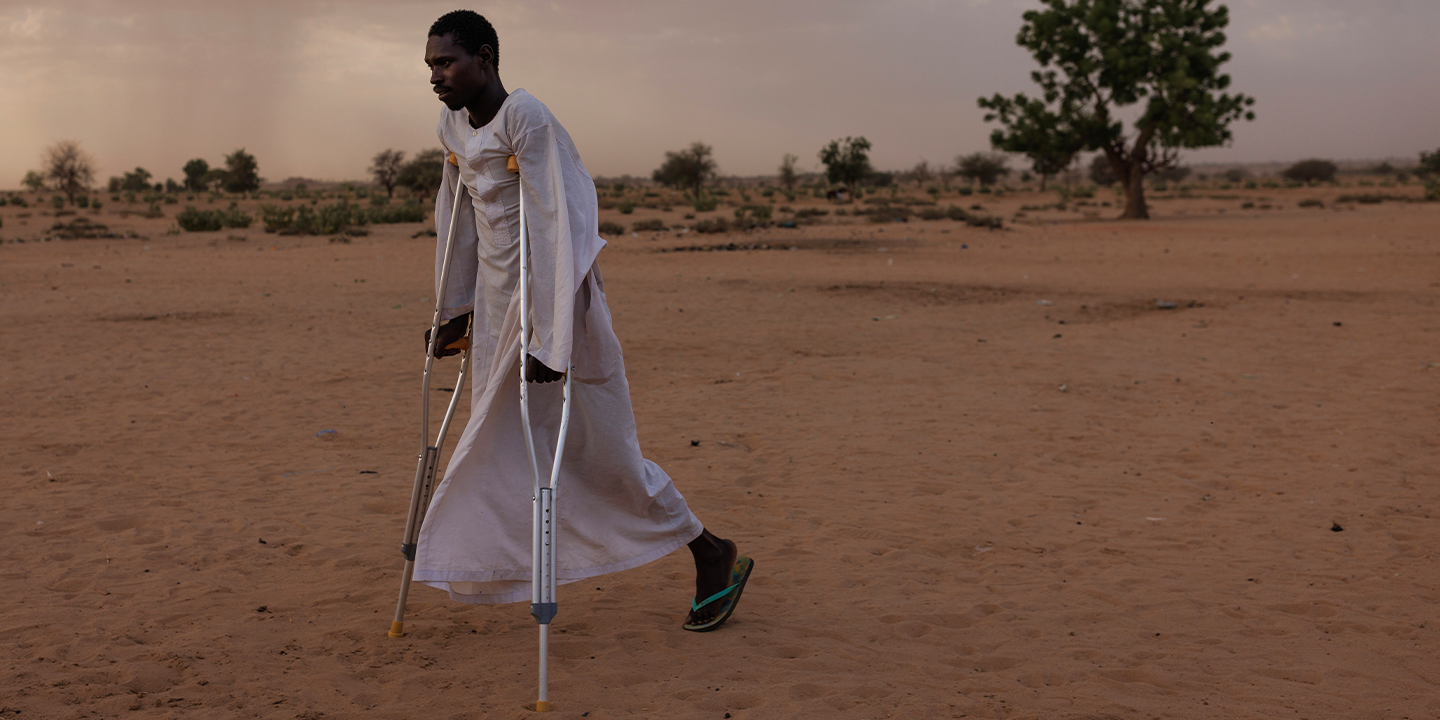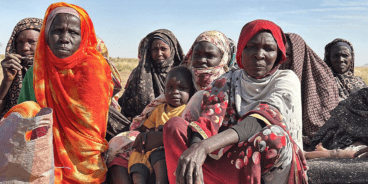

Atrocity Alert No. 411: Sudan, Israel and the Occupied Palestinian Territory and Ukraine
Atrocity Alert is a weekly publication by the Global Centre for the Responsibility to Protect highlighting situations where populations are at risk of, or are enduring, mass atrocity crimes.
RSF ADVANCES MARK A DANGEROUS ESCALATION IN EL FASHER, DARFUR
Reports indicate that over the weekend the Rapid Support Forces (RSF) made significant advances into central El Fasher in North Darfur, Sudan. The RSF reportedly launched a coordinated assault on the city early Saturday, 21 September, striking from at least three directions, and engaged in intense, door-to-door combat. Witnesses described the subsequent clashes as the most violent since the siege of El Fasher began nearly five months ago.
The RSF’s successful breach of the Sudanese Armed Forces’ outer defenses in central El Fasher marks a dramatic escalation in the ongoing conflict, which has intensified considerably over the past week. In response to the alarming escalation, on 21 September UN Secretary-General António Guterres expressed grave concern over the full-scale assault on El Fasher and called on the RSF’s commander, General Mohamed Hamdan “Hemedti” Dagalo, to “act responsibly and immediately order a halt to the RSF attack.”
During the past year, the fall of major capital cities across Darfur, including El Geneina in West Darfur, was followed by systematic campaigns of ethnic cleansing targeting non-Arab communities. The RSF have followed a consistent strategy in every attack, encircling a town then proceeding to weaken the population by cutting off access to food, medicine, power and the internet. Following this isolation, RSF fighters overwhelm the population using tactics such as systematic arson, sexual violence, killings and the destruction of essential infrastructure.
There is a significant risk that acts of genocide and/or crimes against humanity could occur in El Fasher if the current trajectory continues. On 20 September the UN Special Adviser on the Prevention of Genocide, Alice Nderitu, noted that “the recent escalation of hostilities has unleashed a maelstrom of violence that threatens to consume everything in its path, leaving a trail of devastation and despair in its wake.”
To effectively respond to the ongoing atrocities across Sudan, the international community must consider innovative strategies to increase the resilience of the civilian population in El Fasher. This could include supplying essential resources to sustain core services such as power and water, supporting grassroots and civilian-led protection initiatives and enhancing telecommunication capabilities to facilitate communication and information-sharing. States must apply maximum pressure on the RSF and allied militias to immediately cease hostilities, using diplomatic channels, sanctions and public condemnation to convey the urgent need for an end to the violence.
This week’s gathering of heads of state and government for the opening of the 79th session of the UN General Assembly offers a critical opportunity for the international community to address the situation in Sudan. It is essential that El Fasher is prioritized in every diplomatic exchange and that concrete actions are taken to alleviate the suffering of its civilians.
CIVILIANS IN OCCUPIED PALESTINIAN TERRITORY ENDURE ATROCITIES AND MOUNTING RISKS
Nearly one year into the crisis in the Occupied Palestinian Territory (OPT), Israeli bombardments from air, land and sea continue unabated throughout Gaza, resulting in scores of civilians killed and injured and the widespread destruction of civilian infrastructure. On 23 September the Principals of the Inter-Agency Standing Committee, a high-level humanitarian coordination forum which brings together 19 organizations and consortia within and outside the UN, issued a joint statement on the situation in the OPT stressing, “The protection of civilians is a bedrock principle for the global community and in all countries’ interest. Allowing the abhorrent, downward spiral…will have unimaginable, global consequences. These atrocities must end.”
The impact of these bombardments has been particularly acute on schools sheltering displaced Palestinians. In September alone, the Israeli military has struck 10 schools, with 86 fatalities reported. This includes the killing of at least 32 people since 21 September in strikes on the Az Zaytun and Kafar Qasam schools in Gaza City, as well as the Khalid Bin Waleed school in An Nuseirat. The Office of the UN High Commissioner for Human Rights stated that the pattern of attacks on places of refuge, “especially in an area that the Israeli military has unilaterally declared safe,” indicates an utter disregard for Palestinian civilians’ lives and raises serious concerns “about the systematic commission of disproportionate attacks or attacks directed at civilians, which are war crimes.”
Palestinians in the Occupied West Bank continue to face lethal force and militarized operations, as well as intensifying settler violence, settlement expansion, unlawful demolitions and forced displacement. On 18 September the UN General Assembly overwhelmingly adopted a resolution demanding Israel end its decades-long occupation of Palestinian territory within 12 months. The resolution follows an advisory opinion issued by the International Court of Justice (ICJ) which concluded that Israel’s occupation is illegal and must end “as rapidly as possible.”
Israel has also scaled up attacks across the Lebanon-Israel border to reportedly target Hezbollah sites, creating wider risks for populations throughout the region. Since Monday Israeli airstrikes have killed at least 569 people, including 50 children, according to Lebanon’s Health Ministry, and hundreds of thousands have been displaced.
Israel should heed the demand of an overwhelming majority of UN member states to abide by the ICJ ruling, including ceasing settlement expansions and reversing the annexation of Palestinian territory. As heads of state and government gather for the opening of the 79th session of the UN General Assembly, they should take decisive action to ensure the full implementation of the recent resolution and urge Israel to comply. An immediate ceasefire in Gaza must be urgently reached, all attacks against civilians must be halted and UN Security Council Resolution 2735 should be implemented without delay. Governments should stop transferring arms to Israel given the clear risk that they will be used to commit abuses against Palestinians. Steps toward de-escalation are urgently needed to prevent further suffering and wide-scale devastation in the region.
SUMMER 2024 THE DEADLIEST FOR UKRAINIANS SINCE RUSSIA’S FULL-SCALE INVASION
On 23 September the Norwegian Refugee Council (NRC) released a statement highlighting the increasing toll of the continued Russian aggression in Ukraine on civilians. According to the statement, over 3,200 civilian casualties were recorded in Ukraine between June and August 2024 alone, marking a 33.7 percent increase compared to the same period last year. This was the highest three-month total since 2022. Roberto Vila-Sexto, Ukraine country director for NRC, said, “This summer has been a clear warning of what the impact will be on civilian populations if this war continues to escalate.”
The UN Human Rights Council (HRC)-mandated Commission of Inquiry (CoI) on Ukraine has documented repeated waves of aerial attacks targeting civilian infrastructure, including hospitals and supermarkets, as well as Ukraine’s energy infrastructure. According to the UN Human Rights Monitoring Mission in Ukraine (HRMMU), between 22 March and 31 August nine large-scale, coordinated attacks targeted the power system in 20 regions of the country, causing widespread disruptions to electricity, water, heating and public services. Danielle Bell, Head of the HRMMU, emphasized “Powerful missiles and bombs have struck populated areas, killing and injuring civilians across the country.” Direct and indiscriminate or disproportionate attacks on civilians and civilian infrastructure are illegal under international war and may also amount to war crimes.
Meanwhile, the CoI has provided further documentation on the systematic use of torture by Russian forces in Ukraine. Erik Møse, Chair of the CoI, reported to the HRC on 23 September that the Commission had “gathered evidence of sexual violence used as torture, mainly against male victims in detention, and of rapes targeting women in villages under Russian control… The wide geographic spread of locations where torture was committed and the prevalence of shared patterns demonstrate that torture has been used as a common and acceptable practice by Russian authorities, with a sense of impunity.” The CoI found the prevalent use of sexual violence across “almost all” detention centers, as well as incidents of medical practitioners reportedly taking part in the torture of prisoners of war. Torture is prohibited under international law and may amount to war crimes.
As attacks by Russian forces continue to escalate, the international community must continue to support Ukraine’s air defense systems, which are key to protecting civilians and civilian infrastructure from bombardments. Amid the increase in attacks and impending harsh winter months, additional humanitarian aid is urgently needed for the 14.6 million people impacted and in need of support.
Related Content


Joint Statement: Genocide Returns to Darfur
